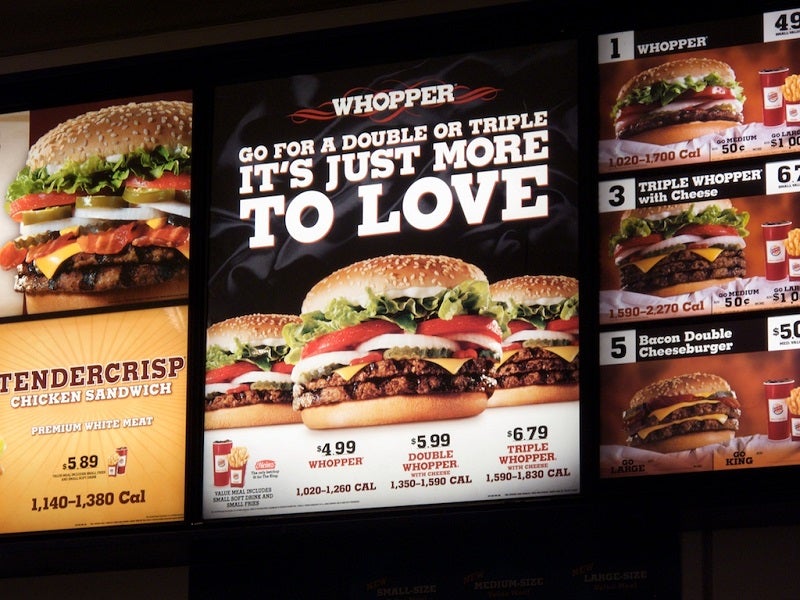Food Watchdog Groups Sue Trump Administration Over Menu Labeling
FDA delayed compliance and jeopardized public health
Contact
The Center for Science in the Public Interest and the National Consumers League, both represented by the nonprofit law firm Earthjustice, filed a lawsuit today in U.S. District Court for the District of Columbia challenging the U.S. Food and Drug Administration’s decision to delay a rule requiring chain restaurants, supermarkets, convenience stores, and other food retail establishments to post calorie counts for prepared food and beverages.
FDA issued the rule requiring disclosure of calorie counts and other nutrition information in 2014 but, one day before industry was due to comply in May 2017, the FDA delayed the compliance deadline for an additional year until May 2018.
Without menu labeling, it’s hard for consumers to estimate the calorie content of popular restaurant items. For instance, a pecan roll from Panera has over 300 more calories than a chocolate pastry. 7-Eleven’s Big Bite Hot Dog & Big Gulp Coke (560 calories and 320 calories, respectively), currently advertised for $2.22, provide more than 40 percent of a person’s suggested daily caloric intake. Some items contain almost an entire day’s worth of calories: a regular oriental chicken salad from Applebee’s contains approximately 70 percent of a person’s suggested daily caloric intake, and a slice of the Cheesecake Factory’s Carrot Cake has more than 80 percent.
Menu labeling also encourages restaurants to offer more healthful menu items and portion sizes. Between 2005 and 2011, healthier food options increased from 13 percent to 20 percent at five fast food chains subject to state and local menu labeling requirements.
“The Trump administration’s delay of menu labeling ill serves consumers, who need and want better information about their food choices,” said CSPI Director of Nutrition Policy Margo G. Wootan. “But the delay also ill serves the restaurant industry, which supports menu labeling and has already invested in new menus and menu boards. By siding with convenience stores and supermarkets over restaurant chains, the Trump administration is randomly sowing chaos.”
Numerous studies indicate that menu labeling is both necessary to and effective in reducing the amount of food purchased and, thus, reducing the health and environmental impacts of food production, consumption, and disposal.
Over two-thirds of U.S. adults and one-third of children are overweight or obese, contributing to high levels of diabetes, high blood pressure, heart disease, and cancer. Eating out contributes to obesity and poor nutrition. On a typical day, 33 percent of children, 41 percent of adolescents and 36 percent of adults eat at fast food restaurants. Studies show that people tend to consume more calories, saturated fat, and sugary drinks and fewer fruits and whole grains when eating out.
“There is absolutely no justification for further delaying this menu labeling rule,” said Sally Greenberg, Executive Director of the National Consumers League. “Consumers overwhelmingly say they use and want nutrition information about the food they are eating or buying when they’re out at restaurants or getting takeout; and many of the leading restaurants and trade associations are already providing calories and other facts about what’s on the menu.”
“The recent delay in the rule is yet another example of the Trump administration’s willingness to accommodate even unfounded and partial industry opposition to the detriment of the health and welfare of people and families across the country,” said Peter Lehner, the Earthjustice senior attorney handling the lawsuit.
“There are monitors that can tell us exactly how many steps we take in a day and how much sleep we get at night, but we are denied the basic right to know how many calories are served at a restaurant,” said Lehner.
FDA’s menu labeling rule has widespread support ranging from the National Restaurant Association to the American public. Eighty percent of consumers support menu labeling in chain restaurants; 77 percent want menu labeling at convenience stores; and 81 percent favor having supermarkets provide calorie information for their prepared restaurant-type foods.
Even though the National Restaurant Association supported the menu labeling rule, some food service establishments, such as supermarkets, convenience stores, and pizzerias continue to complain.
This lawsuit asserts that the delay of the menu labeling requirement—published without prior notice or an opportunity for comment, one day before the menu labeling rule was supposed to take effect—is illegal and must be vacated. Since the regulated industry was ready to comply before the delay, it can promptly comply with the menu labeling rule once reinstated and, thus, begin to provide this important health information to the public without delay, according to the complaint.

Additional Resources
About Earthjustice
Earthjustice is the premier nonprofit environmental law organization. We wield the power of law and the strength of partnership to protect people's health, to preserve magnificent places and wildlife, to advance clean energy, and to combat climate change. We are here because the earth needs a good lawyer.